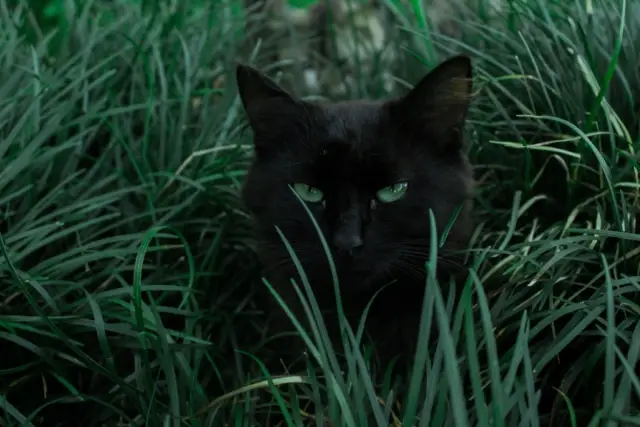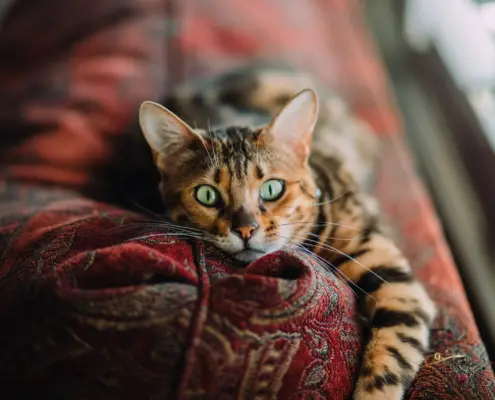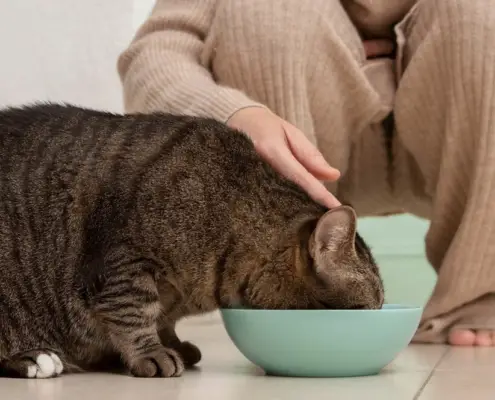
Heartworms are a common and potentially life-threatening parasite that can affect cats. These worms, scientifically known as Dirofilaria immitis, are transmitted through the bites of infected mosquitoes. When a mosquito carrying heartworm larvae bites a cat, the larvae are deposited onto the cat’s skin and then penetrate the skin to migrate through the body, eventually reaching the heart and blood vessels of the lungs.
Cats are not the natural host for heartworms, which means that the parasites do not reach maturity in their bodies. However, even though the worms may not reach adulthood, they can still cause significant health problems for cats. The presence of heartworms in cats can lead to respiratory distress, heart failure, and even sudden death.
The Importance of Heartworm Prevention for Cats
Preventing heartworms in cats is crucial for their overall well-being. While heartworm disease is more commonly associated with dogs, cats are also at risk. The severity of heartworm disease in cats can vary, but even a few worms can cause serious health issues.
Unlike dogs, cats often have a less predictable immune response to heartworms, making the disease difficult to detect. Additionally, there is no specific treatment approved for heartworm disease in cats, making prevention the best approach. By consistently administering heartworm preventatives recommended by your veterinarian, you can protect your feline friend from the potentially devastating consequences of heartworm disease.
Common Symptoms of Heartworms in Cats
Detecting heartworm disease in cats can be challenging, as the symptoms are often nonspecific and can mimic other conditions. Some common symptoms of heartworms in cats include coughing, wheezing, difficulty breathing, reduced appetite, weight loss, vomiting, and lethargy.
In some cases, cats may not show any signs until the disease has progressed. This is why regular veterinary check-ups are essential, as they can help identify heartworm infection in its early stages. If you notice any of these symptoms in your cat, it is important to consult with your veterinarian for a proper diagnosis and treatment plan.
Diagnosing Heartworms in Cats
Diagnosing heartworms in cats can be challenging due to the intermittent nature of the infection and the lack of a definitive diagnostic test. Unlike dogs, where a simple blood test can detect the presence of heartworms, diagnosing heartworm disease in cats often requires a combination of tests, including blood tests, X-rays, ultrasounds, and sometimes even exploratory surgery.
Blood tests can help detect the presence of heartworm antigens or antibodies, but false negatives are possible, especially if the infection is in its early stages. Imaging tests, such as X-rays and ultrasounds, can provide additional information about the condition of the heart and lungs. Your veterinarian will determine the most appropriate diagnostic approach based on your cat’s individual situation.
Treatment Options for Heartworms in Cats
Treating heartworm disease in cats can be challenging and often involves managing the symptoms rather than eliminating the worms themselves. As mentioned earlier, there is no specific treatment approved for heartworms in cats, and the drugs used to treat heartworm disease in dogs can be toxic to cats.
In some cases, surgical removal of the worms may be possible, but this is a risky procedure and not always feasible. Instead, veterinarians focus on alleviating the symptoms and providing supportive care. Medications may be prescribed to reduce inflammation and improve heart and lung function. Close monitoring and follow-up visits are essential to ensure the cat’s well-being and manage any complications that may arise.
Preventative Measures to Protect Your Cat from Heartworms
Prevention is the key to keeping your cat safe from heartworm disease. It is crucial to consult with your veterinarian to determine the most appropriate heartworm prevention methods for your cat. There are several options available, including monthly oral medications, topical treatments, and injectable preventatives.
Administering heartworm preventatives regularly and on time is essential for their effectiveness. Your veterinarian will guide you on the appropriate dosage and frequency based on your cat’s age, weight, and health status. Remember to keep your cat indoors during peak mosquito activity times and take steps to reduce mosquito populations around your home, such as removing standing water.
Natural Remedies for Heartworm Prevention in Cats
While there are no scientifically proven natural remedies for heartworm prevention in cats, some pet owners may prefer to explore alternative options. It is important to note that natural remedies should not be used as a substitute for conventional preventatives, but rather as additional measures to support your cat’s overall health.
The Role of Veterinary Care in Preventing and Treating Heartworms in Cats
Regular veterinary care is vital for preventing and treating heartworms in cats. Your veterinarian will provide guidance on preventive measures, recommend appropriate heartworm preventatives, and monitor your cat’s health for any signs of heartworm infection.
Additionally, annual wellness exams and routine blood tests can help detect heartworm infection in its early stages when treatment options may be more effective. Your veterinarian will also be able to provide advice on managing heartworm disease if your cat is diagnosed.
Frequently Asked Questions About Heartworms in Cats
- Can cats transmit heartworms to other cats or dogs? No, heartworms cannot be directly transmitted from cats to other cats or dogs. The parasites require a mosquito as an intermediary host for transmission.
- Are indoor cats at risk of heartworms? While indoor cats have a lower risk of exposure to infected mosquitoes, they can still be bitten if mosquitoes enter the home. Therefore, it is recommended to administer heartworm preventatives to indoor cats as well.
- Can heartworm disease be cured in cats? There is no cure for heartworm disease in cats, but symptoms can be managed with appropriate treatment and supportive care.
- What is the best time to start heartworm prevention for kittens? Heartworm prevention should start as early as possible, ideally when kittens are around 8 weeks old. Consult with your veterinarian for specific recommendations.
- Can heartworm preventatives cause side effects in cats? While side effects are rare, some cats may experience mild digestive upset or allergic reactions. It is important to discuss any concerns with your veterinarian.
Keeping Your Cat Safe from Heartworms
Heartworms can pose a significant threat to the health and well-being of cats. Understanding the risks, symptoms, and treatment options is crucial for protecting your feline companion. By implementing regular heartworm prevention measures, seeking veterinary care, and being vigilant about mosquito control, you can greatly reduce the risk of heartworm disease in your cat. Remember, prevention is always better than treatment when it comes to heartworms in cats.
Ensure the health and safety of your beloved cat by consulting with your veterinarian and following their recommendations for heartworm prevention. Your furry friend will thank you for it!
If you enjoyed my article, I would appreciate you sharing it with your network.

Sima Ndlebe
Sima writes for CatBuzz. He is interested in Cats, Health and Fitness, and Entrepreneurship.
Published: 12 October 2023
Related Articles
Disclaimer
The content found on CatBuzz.org is presented on an "as is" basis and is intended for general consumer information and education purposes only. Any utilization of this information is voluntary and solely at the user's own risk.
None of the articles or content should be regarded as, or used in place of, veterinary medical advice, diagnosis, or treatment. The information provided on the website is purely for educational and informational intentions and should not be considered a substitute for professional guidance from a veterinarian or other qualified expert. The articles are designed to inform consumers about veterinary healthcare and medical matters that may impact their cat's daily life. It should be noted that this website and its services do not constitute the practice of any form of veterinary medical advice, diagnosis, or treatment. CatBuzz.org explicitly disclaims any liability for any direct or indirect damages or losses that may arise from the use of or reliance on the information contained within the content.
Consumers must consult a veterinarian, veterinary specialist, or another qualified veterinary healthcare provider when seeking advice regarding their cat's health or medical conditions. It is important not to ignore, avoid, or postpone seeking medical advice from a veterinarian or other qualified veterinary healthcare provider solely based on information obtained from this website. If you believe that your cat may be experiencing a medical issue or condition, it is imperative to promptly contact a qualified veterinary healthcare professional.



